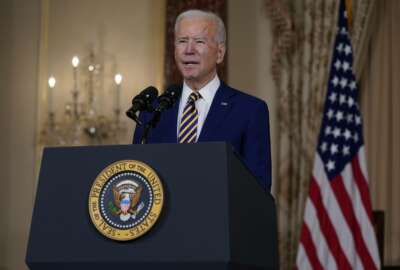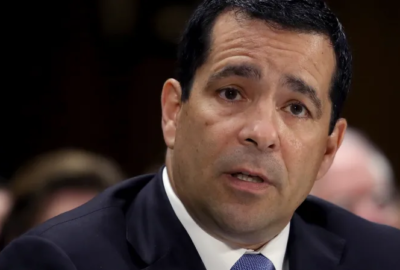
Biden calls for agency ideas to win the race for national security talent
The new memo shows the Biden administration is looking for a wide array ideas from agencies to better recruit, retain and support a diverse national security wo...
Fresh off Thursday’s visit to the State Department, President Joe Biden is asking agencies for a wide array of ideas to tackle longstanding recruitment and retention challenges in the national security workforce.
A new memo, which the White House released Thursday night, calls on agencies to close critical skills gaps and “win the race for talent.”
“For too long, we have asked our public servants to do more in an increasingly complicated and competitive world, with fewer financial resources and less support,” the memo reads. “Their experience, integrity and professionalism have been severely tested. We have fallen short in ensuring that our national security workforce reflects and draws on the richness and diversity of the country it represents. And we have failed to ensure that our public servants have the necessary tools, training and support to fully realize their potential.”
The memo describes the broad principles that will guide national security workforce policies.
Biden, for example, said he expected agencies to restore the independence of their inspectors general and to “work closely and cooperatively with the Congress to ensure it can exercise its vital oversight role,” the memo reads.
National security professionals should offer “expert views and judgments without regard to the political preferences of my administration, the Congress or interest groups, and without fear of reprisal or retribution,” Biden said.
To focus on the national security workforce, the Biden administration will create a new national security inter-agency working group, led by the principal deputy national security adviser.
The deputy director for management at the Office of Management and Budget, the Office of Personnel Management deputy director and the Office of Science and Technology Policy will be co-chairs.
The working group will have a long list of tasks. Biden, for example, is looking for proposals that will allow agencies to address critical staffing needs, recruit and retain a diverse national security workforce at entry and senior levels and surge talent during times of crisis or need.
The administration in particular stressed the need to find top talent with cybersecurity and science, technology, engineering and math (STEM) skills.
The group should also review efforts to modernize the security clearance process and improve reciprocity, the memo said. The Trump administration launched an initiative called Trusted Workforce 2.0, which is designed to update the background investigation process.
On top of that, the group will be responsible for finding new ways to support, develop and promote national security employees through rotational opportunities and other assignments, or through affordable child care options.
Notably, the group will also “identify lessons learned and best practices from the COVID-19 pandemic and develop agency-specific plans to resource and implement changes that build more flexibility and resiliency into the national security workforce, including through remote work options, adoption of secure remote technology, reduction of the over-classification of materials, and flexible work arrangements,” according to the memo.
Intelligence officials have suggested there could be ways for employees to telework more often, but the pandemic has largely forced classified workers to get creative with their schedules and work from the office in shifts.
In some ways, the memo hints at specific strategies agencies might use to recruit and retain top national security talent.
It asks the new working group to, for example, work with the Equal Employment Opportunity Commission to improve agencies’ ability to recruit and accommodate individuals with disabilities to the national security workforce.
It also directed the new group to review the proposals the National Commission on Military, National and Public Service made last year on veterans preference. The congressionally-mandated commission said agencies should apply veterans preference as essentially a tiebreaker between two qualified candidates.
Several organizations and even some members of Congress, including the late Sen. John McCain (R-Ariz.), have suggested the government should change the way it uses veterans preference, but those proposals have faced roadblocks.
In a year, the new working group will submit a report to the White House documenting its progress and its guidance on the critical skills agencies need from the national security workforce.
In addition, Biden’s new memo calls for a review of the existing authorities agencies can use today to hire top talent with special STEM, language or economic skills.
The new working group should identify how agencies are using these authorities, what barriers and challenges exist to using them and recommendations for improving them. The Biden administration is also looking for recommendations, including legislative proposals, that will help agencies better hire top national security talent.
By the Government Accountability Office’s count, agencies have at least 105 different hiring authorities, and they rely on a small fraction of them for the majority of their recruiting efforts.
Beyond the new working group and hiring authority review, Biden’s memo also stresses the importance of incorporating the talent and ideas of more partners into national security work of the federal government.
“To address challenges that government cannot solve on its own, it is imperative that we harness the ideas, perspectives and contributions of partners, including state and local governments, universities and colleges, the private sector and civil society,” Biden’s memo reads. “And just as our national security institutions must serve the American public, so must we seek ways to allow more Americans to engage in public service throughout their careers.”
Copyright © 2024 Federal News Network. All rights reserved. This website is not intended for users located within the European Economic Area.
Nicole Ogrysko is a reporter for Federal News Network focusing on the federal workforce and federal pay and benefits.
Follow @nogryskoWFED




